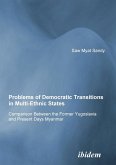The Yugoslav break up and conflict have given rise to a considerable literature offering dramatically different interpretations of what happened. But just how do the various interpretations relate to each other? This ambitious new book by Sabrina Ramet, an eminent commentator on recent Balkan politics and history, reviews and analyses more than 130 books about the troubled region and compares their accounts, theories, and interpretations of events. Ramet surveys the major debates which divide the field, alternative accounts of the causes of Yugoslavia's violent collapse, and the scholarly debates concerning humanitarian intervention. Rival accounts are presented side by side for easy comparison. Thinking about Yugoslavia examines books on Slovenia, Croatia, Serbia, Bosnia-Herzegovina, Macedonia, Montenegro, and Kosovo which were published in English, German, Serbian/Croatian/Bosnian, and Italian, thus offering the English-speaking reader a unique insight into the controversies.
'... a tour de force of extensive reading, commentary, and insight that encounters most of the scholarly controversies surrounding these brutal wars ... Everyone who reads it will come away better informed about the amazing breadth of the rich scholarship on the Yugoslav wars.' The Russian Review








